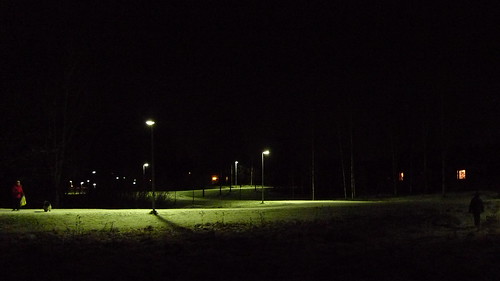Paul commented the posting Use camera automatics or not? reminding that automatics helps to concentrate on the photo.
I'm of course very happy to use automatics, and couldn't really do photography without it, except perhaps for the fact that with a digital camera you can easily do bracketing or use other iterative techniques to find the right exposure.
When using the LX3, the program mode which selects both aperture and shutter speed does often a competent job. But when you need a certain depth-of-field or want a deliberate motion blur, then that does not work. I have been using aperture priority for most of the time, although with a compact camera there is not so much to do in controlling the depth-of-field.
However, the Panasonic iA is a different kind of automatics, and I have found it unpredictable. (And I feel that automatics should be somewhat predictable.) The iA mode raises ISO automatically, uses different focusing and exposure metering modes depending on the scene mode it selects, and so on.
In the iA mode you have "an artificial photographer" living in the camera, and I don't like to out-guess and compete with it.
But I have used it occasionally, such as in this photo where I wanted to see what it would do. Well, the camera raised ISO to 800, used a shutter speed of 1/8 seconds, and struggled with focusing quite a lot. (You can't use manual focusing with iA.) But the result is not so bad despite the noise.
Moving from automated photography to humans, BBC had an interesting article titled Four philosophical questions to make your brain hurt. Here is a quote: "Consider a photo of someone you think is you eight years ago. What makes that person you? You might say he she was composed of the same cells as you now. But most of your cells are replaced every seven years. You might instead say you're an organism, a particular human being, and that organisms can survive cell replacement - this oak being the same tree as the sapling I planted last year. [...] In the end, then, no attempt to make sense of your continued existence over time works. You are not the person who started reading this article."
Humans are of course much more unpredictable photographers than any camera automatics.
So, who are you now that you are here at the end of this posting?
Saturday, November 22, 2008
On automated photography
Subscribe to:
Post Comments (Atom)




2 comments:
Do not be so negative. For IA to succeed it is enough to fill people's heads with silly problems. Once total silliness is achieved it gets quite easy to automate.
But to the point. After 37 years of various automated cameras I still have to understand why it is better to use an Autoexposure if you have to make complex (and fuzzy) considerations on how to correct it. Why not simply dial in the guessed exposure ? Or, maybe, it is just me being unable to understand the manuals ?
I agree that camera manuals are nowadays quite difficult - I was quite lost with the LX3 until I discovered aperture priority and manual focusing.
Every so often I get some benefit from the automatics, though, so I wouldn't say that it is all unnecessary.
Post a Comment